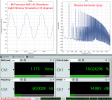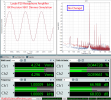As many others I have a PV system on the roof. The inverters are slaved to the grid phase (the law here and I guess elsewhere). On a sunny day I produce more than I need.
There have always been stories that the AC quality imprints on an amp’s audio quality. In times where routers and network cables are getting audiophile branding, the question of AC power may deserve a (Xmas) thread.
How close do my inverters follow the grid lead? Are there tolerances and will my amp notice them? Is that different when some of the grid power is still used or when I am 100% self as supplied and even inject power into the grid?
I have a battery that will produce AC at night, still synced to the grid. Would that be even “purer” power?
It gets even better. I have an isolation switch that allows one of my inverters to produce AC when the grid is dead. In that case, my AC quality only depends on my own inverter. I was thinking auf AB tests but it is a bit a huge effort to kill the grid power and jump to island mode. I could run that island inverter by PV (300V) on a sunny day or by battery (50v). Would that make a change? I could probably tap into the battery’s DC bus and attach an audiophile DCAC inverter. The battery is charged via a DCDC converter from the PV. I could probably revert that and drive my amps somehow with DC (it seems that there is already a thread for that).
It seems that the possibilities are endless and I might drop everything else and start exploring. Should I take out patents and market stuff?
There have always been stories that the AC quality imprints on an amp’s audio quality. In times where routers and network cables are getting audiophile branding, the question of AC power may deserve a (Xmas) thread.
How close do my inverters follow the grid lead? Are there tolerances and will my amp notice them? Is that different when some of the grid power is still used or when I am 100% self as supplied and even inject power into the grid?
I have a battery that will produce AC at night, still synced to the grid. Would that be even “purer” power?
It gets even better. I have an isolation switch that allows one of my inverters to produce AC when the grid is dead. In that case, my AC quality only depends on my own inverter. I was thinking auf AB tests but it is a bit a huge effort to kill the grid power and jump to island mode. I could run that island inverter by PV (300V) on a sunny day or by battery (50v). Would that make a change? I could probably tap into the battery’s DC bus and attach an audiophile DCAC inverter. The battery is charged via a DCDC converter from the PV. I could probably revert that and drive my amps somehow with DC (it seems that there is already a thread for that).
It seems that the possibilities are endless and I might drop everything else and start exploring. Should I take out patents and market stuff?


